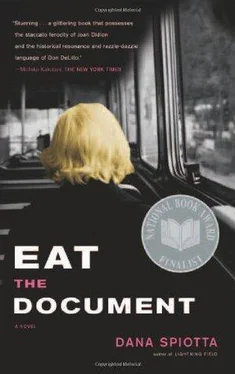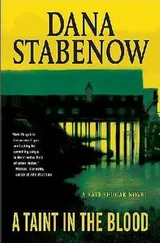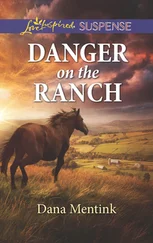Dana Spiotta - Eat the Document
Здесь есть возможность читать онлайн «Dana Spiotta - Eat the Document» весь текст электронной книги совершенно бесплатно (целиком полную версию без сокращений). В некоторых случаях можно слушать аудио, скачать через торрент в формате fb2 и присутствует краткое содержание. Год выпуска: 2006, Издательство: Scribner, Жанр: Современная проза, на английском языке. Описание произведения, (предисловие) а так же отзывы посетителей доступны на портале библиотеки ЛибКат.
- Название:Eat the Document
- Автор:
- Издательство:Scribner
- Жанр:
- Год:2006
- ISBN:нет данных
- Рейтинг книги:3 / 5. Голосов: 1
-
Избранное:Добавить в избранное
- Отзывы:
-
Ваша оценка:
- 60
- 1
- 2
- 3
- 4
- 5
Eat the Document: краткое содержание, описание и аннотация
Предлагаем к чтению аннотацию, описание, краткое содержание или предисловие (зависит от того, что написал сам автор книги «Eat the Document»). Если вы не нашли необходимую информацию о книге — напишите в комментариях, мы постараемся отыскать её.
shifts between the underground movement of the 1970s and the echoes and consequences of that movement in the 1990s. A National Book Award finalist,
is a riveting portrait of two eras and one of the most provocative and compelling novels of recent years.
Eat the Document — читать онлайн бесплатно полную книгу (весь текст) целиком
Ниже представлен текст книги, разбитый по страницам. Система сохранения места последней прочитанной страницы, позволяет с удобством читать онлайн бесплатно книгу «Eat the Document», без необходимости каждый раз заново искать на чём Вы остановились. Поставьте закладку, и сможете в любой момент перейти на страницу, на которой закончили чтение.
Интервал:
Закладка:
“I hate animal supremacists,” Miranda said, biting at the nail on her thumb.
“I think they are actually called animal rights activists,” Nash said.
She smiled at him and continued. “I do. Their blond dreadlocks and hemp clothes. Reggae-listening, green-panther, righteous rich kids.”
“Are they green panthers, or are they more rightly called panther panthers?” Nash said.
Miranda spoke in a stagy whisper.
“Just look at them,” she said. She tapped a finger on Nash’s arm and indicated several kids loitering around the magazine stand. The usual marauders. Miranda gestured toward a petite henna-haired girl. She wore a camouflage khaki jacket that had a large circle painted on it with fur written inside and a red bar crossing it out. Her pants leg featured a Beef Nation = Killing Fields patch; she also displayed an American Animal Diaspora insignia, not sewn but pinned loosely to her hat brim. Everything she wore had that same contrived, raggedy look. “Especially those militants.” She lowered her voice and shifted her eyes back and forth dramatically. “I live with some of them. Calling themselves Animal Marshals and Liberationists. All that pseudomilitary speak, and the uniforms. I don’t trust them.” She looked at Nash, bit her nail and then continued. “They are offended by fur coats. Yeah, fur coats are offensive, but it is because of the cost, not the animals. Someone spends twenty thousand dollars on a coat while there are people without food or shelter. Can’t people ever feel any shame? What kind of society tolerates the idea of people sleeping in the street while other people walk right by in twenty-thousand-dollar coats? That’s what’s offensive.” Miranda looked at Nash, her eyebrows pressing together, and she took a deep breath.
Nash shook his head. “I had no idea you hated animals,” he said.
She had already made her point, but that didn’t stop her because, well, sometimes she couldn’t stop. That was one of her problems. She would start out trying to be provocative but end up completely earnest about what she was saying. She would start out intending to be cynical and aloof and end up with an embarrassing catch in her voice.
“I just hate people who have the wrong analysis, you know? Who miss the economics. Who just see it as one issue. Who have just enough compassion for the cute animals. Who care about the rest of the people in the world only when it starts to affect their world.” She waited for a response, stared at Nash with her large brown eyes, her mouth a stern frown until she bit her lip, a waiting thing she did that she knew betrayed how anxious she felt and how urgent.
“That’s good for you, Miranda. You must protect yourself with the ‘breastplate of righteousness and the ammunition of determination’ or something, more or less, like that.”
His condescension upset her, but she also knew he was quoting something she should know but didn’t, so she just swallowed it. She liked him anyway — he was smart and funny, yes, but something else, too. It was nice, wasn’t it (or at least different) that he didn’t feel he had to prove anything? Most of the time Nash seemed content to be anonymous and almost egoless. But despite that, if someone did look closely, it was hard not to notice things. The excitement he betrayed during the meetings — she could see it, or thought she could. He had a weathered face, unremarkable except when he broke into this lopsided, purely local smile. He would undermine his own expressions by only half-committing his face to them. His frowns were belied by amused eyes; his grins pushed the edge of smirk by a narrowing boredom in his brow. It could be noted, this tendency. And read as unsettling, or intriguing. Miranda, anyway, noticed.
Miranda also began to notice things in the meetings Nash led (or “facilitated,” because naturally there were no leaders). They were held on Tuesday and Thursday nights under Nash’s highly mannered and hermetic nomenclature: SAP (Strategic Aggravation Players and/or Satyagraha by Antinomic Praxis); or the Neo Tea-Dumpers Front; or Re: the “Re” Words — Resist, Reclaim, and Rebel; or the “K” Nation (single-tactic group that merely inserted the letter k or removed the letter k —dislokations were what they called them — to cause psychic discomfort and disturbances. As in blac bloc instead of black block, or Amerika instead of America . They sent out ransom-note-style missives to unnerve their targets: Welkome, konsumers! You have been under attac. Better watch your bac, et cetera). It didn’t take long for her to realize that Nash’s groups never met more than once under the same name. She noticed that the same kids were at each meeting. These were the most wounded looking of the kids who frequented Prairie Fire. The fattest ones, or the ones with the worst skin, or the ones with the most solipsistic hygiene habits.
Was it the same group with different names, or different groups with the same members? Each meeting always started with a demand that all cops and media identify themselves and be excused from the meeting. It seemed at first genuine, then a little self-aggrandizing, and finally, she realized, after the third week, to be a parody of left-wing paranoia, to ridicule the people who imagined they were constantly surveiled or infiltrated. But she couldn’t be sure — it was all those things at once. They were planning to participate in some test or another with hundreds of other groups. Whatever antiglobal or anticorporate event that would occur. They discussed dozens of actions and prankster-type tests: pirating public-space surveillance cameras, infiltrating and disturbing business associations, staging website virtual sit-ins, performing seemingly ad hoc “plays” in malls and other retail environments. They planned to dress in suits and pass out dollar bills in Pioneer Square to the shoppers. They discussed defacing billboards and prancing nearly naked fat women in front of Barneys to ask people as they entered or left if there was anything available in their size. Always they were anticorporate. Mostly they were funny and absurd. And they wanted, it seemed to her, to point out the contradictions that had become so normalized in people’s eyes.
There were other meetings, not run by Nash, but Miranda wasn’t as interested in those. They were tedious and repetitive and conventional. Miranda kept coming to Nash’s groups and became quite excited by the actions they discussed. She truly believed that if people felt the weight of what they did, understood the consequences, it might change their lives. Or they might change their lives. And this would — albeit in small, incremental ways — eventually change the world. It was simple and obvious to her, the truth of such a strategy.
She guessed that Nash had pursued these kinds of activities his whole life. He must know some secret way of being in opposition to the culture at large that didn’t frustrate him. Miranda had felt a passionate and hopeful optimism about people for as long as she could remember, but already she grew frustrated when she realized that others still refused to see the way the world should be. It was like they’d forgotten how to be good. They’d made it complicated.
For all of June and into July, Miranda attended every meeting, and after every meeting she made it a point to stick around and help Nash pick up the recyclable paper cups, and then they would talk, more and more each time, stretching the cleanup into the evening. Nash would open the back door to get air into the hot, stuffy space, which finally began to cool down after the crowds left. She often stood in the doorway and looked at the night sky, reluctant to leave even after they finished the cleanup.
Читать дальшеИнтервал:
Закладка:
Похожие книги на «Eat the Document»
Представляем Вашему вниманию похожие книги на «Eat the Document» списком для выбора. Мы отобрали схожую по названию и смыслу литературу в надежде предоставить читателям больше вариантов отыскать новые, интересные, ещё непрочитанные произведения.
Обсуждение, отзывы о книге «Eat the Document» и просто собственные мнения читателей. Оставьте ваши комментарии, напишите, что Вы думаете о произведении, его смысле или главных героях. Укажите что конкретно понравилось, а что нет, и почему Вы так считаете.












